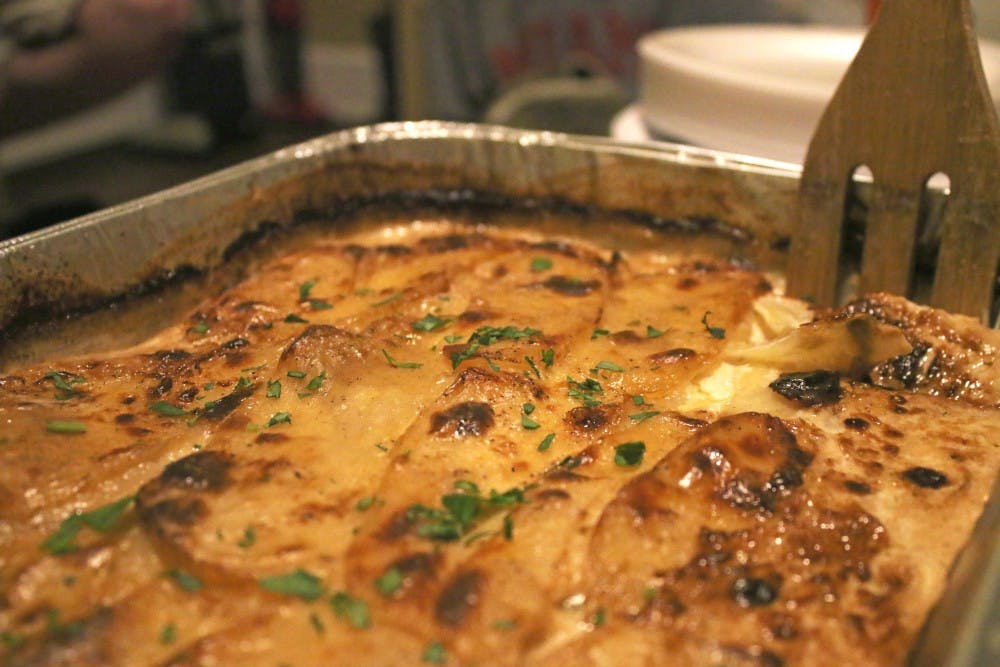I spent this past summer in Michigan's Leelanau peninsula, curing duck, portioning fish, roasting vegetables and peeling potatoes.
The Leelanau, as locals and longtime vacationers call it, is a simplistically beautiful place. Sun drenches the forest, a clear and healthy wind that barrels across the lake and turquoise water fills yawning bays carved out some 14,000-odd years ago by retreating glaciers that left behind towering sand dunes. The basic elements of creation feel present there.
The region's beauty and mild climate has made it a premier tourist destination in the state. The peninsula protrudes from the northwest corner of the state, and it sits on top of the northern 45th parallel of the globe -- travel due east across the Atlantic and you'll hit Bordeaux and France's Rhine river valley. In recent years, the area has sprouted vineyards and wineries in equal parts reflection and aspiration of its European counterparts.
Winemakers aside, out of the region's crowded restaurant scene, one chef and his kitchen embody the geographic connection to the French countryside and its culinary traditions.
Guillaume Hazael-Massieux was born in Paris and attended culinary school in France before he moved to southern Michigan in 1996. He eventually found his way north along the state's west coast and purchased La Becasse, a small French-country-style restaurant in the Leelanau town of Glen Arbor. He works as chef-owner, his time split between La Becasse and a French bistro he opened a half hour away in Traverse City.
At the beginning of June, I started part-time as a prep cook at La Becasse. I applied for the job to cover some of my living costs while I tried to finish classwork and clear my head from what was my most personally-disastrous semester at Miami.a
But I also took the job because I wanted to learn how to cook in a professional kitchen -- a real kitchen. I had been a home cook for a while, constantly making dinner for roommates and family, tearing my way through Kitchen Confidential and watching everything Bon Appetit ever posted on Youtube.
As the weeks rolled from June into July into August, I slipped deeper into the isolation of living alone in a forest, without roots in a tourist community reliant on constant human turnover. Life took on a rote simplicity: eat, stress, sleep, then do it all over again.
My few days a week prepping for the dinner shift at La Becasse were rote, too. Mostly, I prepared the same dishes every shift. The restaurant had a small menu, and French country cooking isn't unusually complex. While the sauces and stocks for soups required close attention and technique -- and were largely out of my purview, even by the end of the summer -- the constituent parts of almost every meal served were the same: meat, vegetables and a starch, most often some kind of potato, usually potato au gratin.
Au gratin is a straightforward dish: Potatoes, cream, salt. Elemental.
Start by peeling potatoes -- six russets will do well for a home kitchen. We sometimes used a dozen at La Becasse. Slice them to an eighth of an inch, or as thin as you reasonably can. Mix salt with about a quart of heavy cream, until the cream itself is noticeably salty. Arrange the potatoes, overlapping the slices in a deep baking dish and pouring cream between each layer. Leave an inch between the potatoes and the rim of the dish. Cover in foil and bake for about 40 minutes at 350 degrees.
If the potatoes are starting to soften (check with a fork) and the cream is starting to brown at the edges, take the foil off and bake at 400 degrees for maybe 30 more minutes. If it's not brown or the potatoes are hard, cook longer and check regularly.
I made that dish twice a week for a whole summer. I made it from memory for my mother's birthday, and I made it again on Sunday for our staff.
In a kitchen busy with cooks and their projects, the overhead space brimmed with personal jabs and profanities in three languages -- Chef Guillaume's in French, Blanca's in Spanish, mine and all the rest in English. The kitchen air, thick with conversations about movies and the inner-workings of Honda sedans and high school graduations and Argentina's performance in the World Cup and bear hunting and blown-out knees, was best cut by the waft of browning potatoes cooked long and simply in cream and salt.
Despite the repetitiveness of my shifts as a prep cook, work in the kitchen was different than the monotony of the days I spent cooped up by myself. It was healthier -- still routine, but made warmer and brighter by company, and by simple food cooked well.

